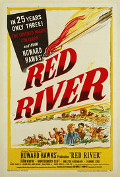
Directed by
Howard Hawks
133 minutes
Rated PG
Reviewed by
Bernard Hemingway


Red River
Red River is exhilarating film-making from one of the masters of the golden age of Hollywood in his first helming of a Western (Arthur Rossen, the second unit director who shot thecattle drive and large scale action sequences was given a co-director credit) , Within the first half hour the film has lain down the main tenets of cowboy capitalism - the assertion of private ownership of the land, something which initially requires the dispatch of some 'hostiles" and a swarthy Mexican - and the American Dream, individual dominance, something which ultimately leads to a generational showdown between two strong-willed males..
Montgomery Clift (somewhat oddly cast but engaging in his first screen role) plays the sensitive foster son, Matt, who stands up to his gruff old-timer guardian, Thomas Dunson (John Wayne) as they undertake one of the iconic acts of Wild West mythology - the cattle drive.
Although John Ford has the reputation as the most defining director of Westerns, Hawks’ film is dramatically richer than is typical with that director's work, being less dependent on rather two-dimensional characterisations and ideological didacticism that make Ford’s films less rewarding in this respect (some of Ford’s stock players like Harry Carey Jr and Hank Worden turn up here). John Wayne rises impressively to the occasion, going beyond the paternalistic man’s man of Ford’s film to being a much less admirable albeit understandable individual as he attempts to salvage his life’s dream.(After seeing the film, Ford is quoted as saying, "I never knew the big son of a bitch could act".)
Although, as so many Westerns of this era were, Red River is based on magazine ('The Saturday Evening Post' to be exact) story written by Borden Chase who wrote the screenplay with Charles Schnee, the dramatic heart of the film, was apparently derived from the 1935 version of Mutiny On The Bounty, which pitted Clark Gable’s young and charismatic Fletcher Christian against Charles Laughton's tyrannical Captain Bligh.
The ending with its contrived, heavily expository dialogue flaws the film somewhat as does in general the introduction of Joanne Dru’s character, Tess Millay, a rather too-symmetrical re-iteration of the young woman that Wayne’s Dunson lost to Injuns at the story’s outset (his reaction to her demise is the first of the film's unconvincing moments). Whilst Hawks’ does a terrific job of convincing us of the dusty, dirty, sweatiness of the cowboy’s life, Tess never looks less than wedding-cake perfect and her rapid fire soap-opera-ish yammerings are incongruous. Had all of this been left out Red River would have been a stronger film
Notwithstanding, with a rousing score from the prolific Dimitri Tiomkin and Russell Harlan's majestic photography,. Red River is one of the high-points of the era of the classic Western, .
FYI: Joanne Dru subsequently married John Ireland whose character Cherry Valance never fulfills the role in the narrative promised by his initial appearance, allegedly because Hawks who was also keen on Dru cut him out of the final print although the director claims it was because of Ireland's drinking and unprofessional behaviour. He does however share an outstanding bit of dialogue with Clift. As Matt and Cherry admire each other's six-shooters he says: There's only two things more beautiful than a good gun, A Swiss watch and a woman from anywhere. You ever had a good Swiss watch?"
The full version runs 13 3mins so beware of a shortened version sometimes shown on TV with a Walter Brennan voice-over replacing the diary pages. The famous scene of whooping cowboys that begins the drive to Missouri is featured in Peter Bogdanovich's masterful epitaph to the mythic Wild West, The Last Picture Show (1971).
Want something different?





